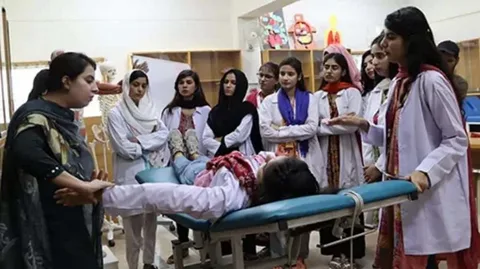Physiotherapy is no longer a supporting profession in healthcare—it has become a core medical field that plays a vital role in patient recovery, rehabilitation, and preventive care. In Pakistan, particularly in Lahore, the demand for skilled physiotherapists is rapidly increasing, creating excellent career opportunities for students. The Doctor of Physical Therapy (DPT) program in Lahore is designed to equip students with the knowledge and practical training required to thrive in this growing field.
This guide explains the future of physiotherapy in Pakistan, the details of the DPT program in Lahore, career opportunities, salaries, and why students should consider physiotherapy as their long-term career path.
What is the DPT Program?
The Doctor of Physical Therapy (DPT) is a five-year undergraduate professional degree that prepares students to diagnose, manage, and treat physical impairments caused by injury, illness, or congenital conditions. Unlike short physiotherapy diplomas, the DPT program is internationally recognized as a professional doctorate, giving graduates a competitive edge in Pakistan and abroad.
The program focuses on:
- Theoretical knowledge of anatomy, physiology, biomechanics, and pathology.
- Clinical training in rehabilitation, exercise therapy, and diagnostic techniques.
- Specialized care, including orthopedic, neurological, pediatric, and cardiopulmonary physiotherapy.
- Research and practice, enabling students to contribute to evidence-based medicine.
Why Choose Lahore for a DPT Program?
Lahore is widely considered the medical education hub of Pakistan, offering world-class institutions and modern healthcare facilities. Some of the reasons why Lahore is an excellent choice for pursuing physiotherapy include:
- Renowned Institutions – Universities such as the University of Lahore (UOL), King Edward Medical University (KEMU), Riphah International University, and the University of Health Sciences (UHS) are highly reputed for DPT programs.
- Practical Training – Students gain access to top hospitals and rehabilitation centers in Lahore for hands-on clinical practice.
- Diverse Career Options – Lahore has a large healthcare network, fitness industry, and private clinics that open multiple job avenues.
- Research & Exposure – Many institutions focus on research in physiotherapy, preparing students for global recognition.
Structure and Curriculum of the DPT Program
The DPT program is divided into ten semesters over five years. The curriculum is designed to cover both basic medical sciences and advanced physiotherapy techniques.
1. Basic Medical Sciences (Years 1–2)
- Anatomy
- Physiology
- Biochemistry
- Pharmacology
- Pathology
2. Core Physiotherapy Courses (Years 2–3)
- Biomechanics
- Exercise Therapy
- Electrotherapy
- Kinesiology
3. Specialized Physiotherapy (Years 3–4)
- Orthopedic Rehabilitation
- Neurological Rehabilitation
- Pediatrics
- Cardio-Pulmonary Physical Therapy
4. Clinical Practice & Research (Years 4–5)
- Hospital rotations in Lahore’s teaching hospitals
- Research methodology and thesis writing
- Advanced case studies
This comprehensive curriculum ensures that students graduate as highly skilled, confident, and research-oriented professionals.
Admission Requirements
To get into a DPT program in Lahore, students typically need:
- F.Sc. (Pre-Medical) or equivalent qualification with at least 60% marks.
- For A-Level students, an equivalence certificate from IBCC is required.
- Some universities conduct their own entry test and interviews.
Since DPT is one of the most competitive programs in medical sciences, students must maintain strong academic performance to secure admission.
Scope and Career Opportunities
The future of physiotherapy in Pakistan, especially in Lahore, is very promising. As awareness about physical wellness, rehabilitation, and preventive care increases, the demand for professional physiotherapists continues to grow.
Here are some career paths for DPT graduates:
- Hospitals and Clinics – Treating patients recovering from surgeries, injuries, or illnesses.
- Rehabilitation Centers – Long-term care for stroke patients, accident victims, or those with chronic conditions.
- Sports Industry – Working with athletes, gyms, and fitness centers to prevent injuries and enhance performance.
- Private Practice – Many physiotherapists in Lahore open their own clinics, building independent practices.
- Academia & Research – Teaching in universities or conducting physiotherapy-related research.
- International Careers – DPT graduates from Lahore are in demand in Middle Eastern countries, Europe, and North America (after fulfilling licensing requirements).
Salary and Earning Potential
Physiotherapy offers stable and competitive salaries in Pakistan.
- Fresh graduates typically earn between PKR 35,000 – 60,000 per month in Lahore.
- With 3–5 years of experience, salaries can rise to PKR 80,000 – 120,000 per month.
- Specialized physiotherapists and clinic owners can earn even higher, sometimes PKR 200,000 or more per month.
- Abroad, Pakistani physiotherapists earn significantly more, especially in Gulf countries where monthly salaries range from AED 7,000 – 15,000.
This makes DPT one of the most rewarding medical fields in terms of both service and financial stability.
Future of Physiotherapy in Pakistan
The future of physiotherapy in Lahore and Pakistan overall is extremely bright, and here’s why:
- Rising Healthcare Needs – With increasing cases of orthopedic problems, sports injuries, and road accidents, physiotherapists are in higher demand than ever.
- Growing Awareness – People are becoming more conscious of rehabilitation, fitness, and pain management.
- Global Recognition – Pakistani DPT graduates are recognized internationally, particularly in the USA, UK, and UAE.
- Government Recognition – Physiotherapy is now acknowledged as a vital medical service, with more hospitals hiring full-time physiotherapists.
- Expanding Private Clinics – Lahore alone has seen rapid growth in physiotherapy clinics, making private practice a lucrative option.
Why Physiotherapy is a Smart Career Choice
Students who pursue physiotherapy benefit from:
- A professional degree that is recognized globally.
- A career where they directly impact patients’ lives by reducing pain and restoring mobility.
- Job security, since healthcare demand will never decline.
- The flexibility to work in hospitals, private practice, or abroad.
For those who want a medical career with a strong balance of service, financial growth, and international mobility, physiotherapy stands out as one of the smartest choices today.
Final Thoughts
The DPT program in Lahore provides a solid foundation for students who aspire to enter the healthcare sector as physiotherapists. With a comprehensive curriculum, modern clinical training, and abundant career opportunities, graduates are well-prepared to serve in Pakistan and abroad.
Physiotherapy is not just a career—it is a mission to help people regain independence, recover from injuries, and improve their overall quality of life. As healthcare needs continue to rise, the future of physiotherapy in Lahore looks brighter than ever, making it one of the most attractive and rewarding career paths for young students today.
Frequently Asked Questions (FAQs)
1. What is the duration of the DPT program in Lahore?
The Doctor of Physical Therapy (DPT) program in Lahore is a five-year professional degree, divided into 10 semesters. It includes both classroom learning and clinical practice in hospitals and rehabilitation centers.
2. What is the eligibility for admission in a DPT program?
Students must have completed F.Sc. (Pre-Medical) or equivalent with at least 60% marks. A-Level students need an equivalence certificate from IBCC. Some universities also conduct entry tests or interviews.
3. Which universities in Lahore offer the DPT program?
Leading institutions include:
-
University of Lahore (UOL)
-
King Edward Medical University (KEMU)
-
University of Health Sciences (UHS)
-
Riphah International University
-
Lahore College of Physical Therapy
4. What is the fee structure for DPT programs in Lahore?
-
Public universities: PKR 40,000 – 80,000 per year
-
Private universities: PKR 200,000 – 400,000 per year
Fees vary depending on facilities, reputation, and faculty.
5. What subjects are taught in a DPT program?
The curriculum covers:
-
Basic sciences like Anatomy, Physiology, and Biochemistry
-
Core physiotherapy courses such as Exercise Therapy, Biomechanics, and Electrotherapy
-
Specialized areas including Orthopedic, Neurological, and Pediatric Rehabilitation
-
Clinical practice and research work





